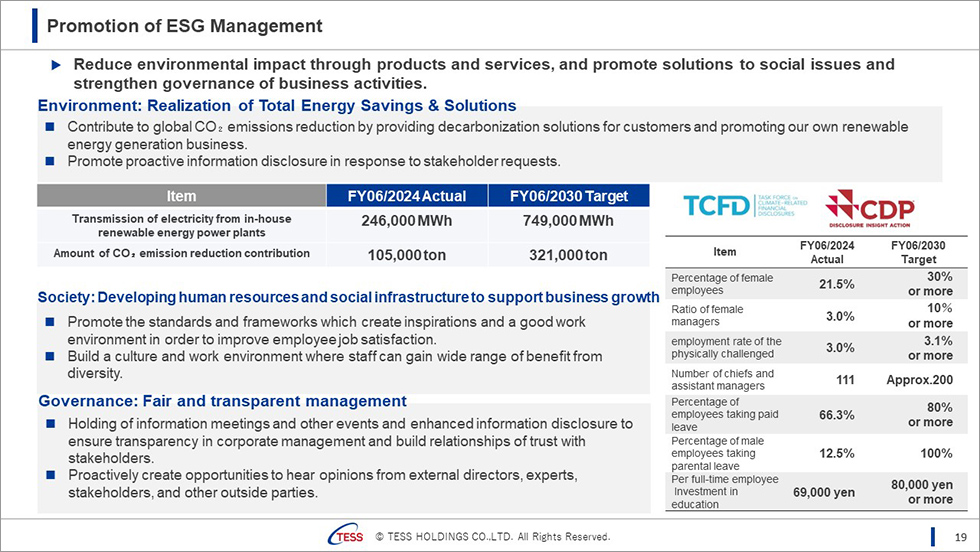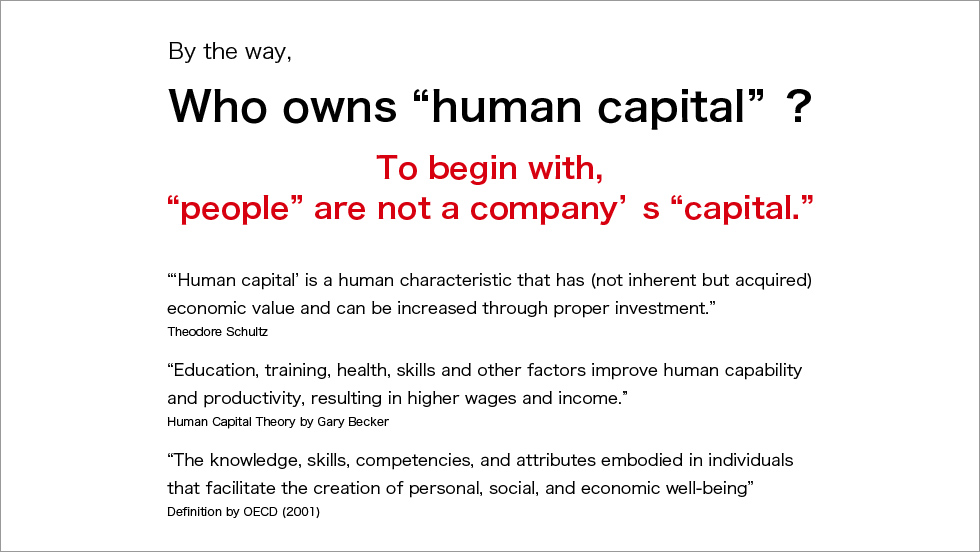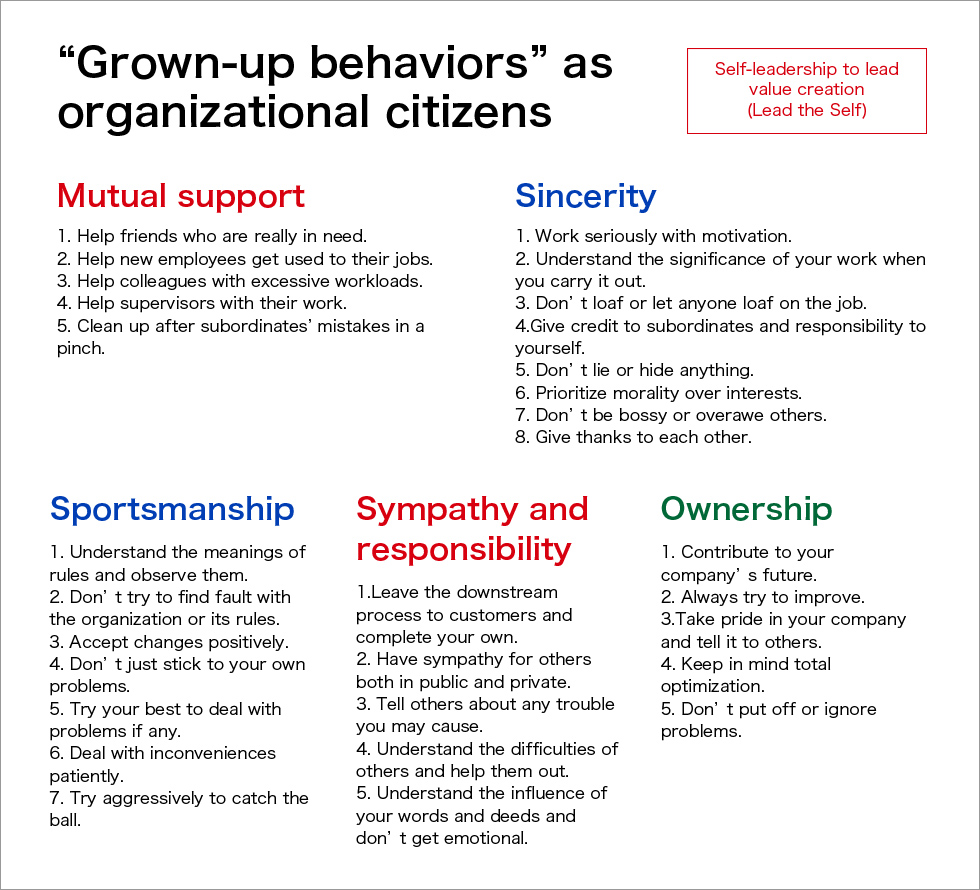Sustainability


The 2nd Stakeholder Dialogue (September 2024)
【Outline】
At the second dialogue held in September 2024, we invited three external experts to exchange opinions on the themes of human capital management and diversity. Professor Noda of Meiji Business School gave a keynote speech on human capital management. Ms. Tashiro of Daiwa Securities Group Inc. (“Daiwa Securities Group”) and Mr. Nakato of Osaka Gas Co., Ltd. (“Osaka Gas”) talked about their companies’ perspectives on diversity and inclusion (D&I) specific initiatives on human capital management.
【Attendees】
【External experts】
-

- Mr. Minoru Noda (Facilitator)
- Professor
Meiji Business School
Graduate School of Global Business
-

- Ms. Keiko Tashiro
- Deputy President
Head of Sustainability, Financial Education, Securities Asset
Management and Think Tank
Daiwa Securities Group Inc.
-

- Mr. Yasushi Nakato
- Head of ESG Office
Corporate Strategy Department, Corporate Planning Headquarters
Osaka Gas Co., Ltd.
【TESS Holdings Co., Ltd.】
- ●Representative Director and President: Kazuki Yamamoto
- ●Executive Managing Director: Toshihiro Takasaki (President & Chief Executive Officer of TESS Engineering Co., Ltd.)
- ●Director, In-charge of ESG and Women’s Empowerment, General Manager of the Human Capital Strategy Division: Mayumi Yoshida (Chair of the ESG Promotion Committee)
- ●Director, In-charge of ESG of TESS Engineering Co., Ltd.: Tsutomu Watari* (Vice Chair of the ESG Promotion Committee)
- ●Director, Audit and Supervisory Committee Member: Katsushige Fujii*
- ●External Director, Audit and Supervisory Committee Member: Hiroyuki Okura
- ●External Director, Audit and Supervisory Committee Member: Masaki Inoue
- ●External Director, Audit and Supervisory Committee Member: Akio Hamamoto
- ●ESG Promotion Committee Secretariat: Kengo Makino, Hinano Mizuta, Airi Asada
- ●ESG Promotion Committee Diversity & Inclusion Working Group: Hiroki Matsumoto,* Ena Kawashima, Teppei Imai
- ●Observer Participation : Yoshihiro Matsumoto*
- *Online participation
【External observers】
- ●One person from Daiwa Securities Group, Inc.
- ●One person from Daiwa Securities Co., Ltd.
【Exchange of opinions with external experts】
Enhancing employees’ motivation
TESS Holdings (THD) Secretariat: The TESS Group currently aims to be a company with a comfortable and rewarding work environment. As we pursue a more comfortable work environment, however, we are afraid that it may reduce motivations for working more and earning more. As employees with varied styles of working and different types of performance are intermingled, what kind of system and education would be effective for each employee to feel satisfied with their work and contribute to enhancing corporate value?
Daiwa Securities Group Tashiro: The best way is to constantly send a strong message from the company to employees, recognizing that the company and their work do contribute to society. I think it important that each employee can feel how their work is connected to the enhancement of corporate value and social contribution.
Osaka Gas Nakato: Our company’s personnel programs include role-based career interviews and training sessions for employees aged 30 to 60 years to help them accept changes in their environment and find their jobs more rewarding than before.
We also plan to introduce goal management and performance evaluation systems that will support employees in their pursuit of higher goals and timely evaluate their contributions to business results. By supporting employees’ challenges and growth, we are trying to enhance their motivation.
Meiji Business School Noda: From an academic viewpoint, there are two types of motivations: extrinsic and spontaneous motivations. One example of extrinsic motivation is economic rewards. Money is a strong factor of motivation. However, working just for money is not very healthy. A desire to get money can lead you to do unnecessary overtime work to earn overtime pay. Without relying too much on extrinsic motivation, you should focus more on spontaneous motivation. Examples of spontaneous motivation include the realization of social contribution, interest in the work itself, and the realization and anticipation of growth, which provide strong motivations. I think the key lies in how to offer spontaneous motivation.
Childcare leave for male employees
THD Secretariat: We want to create conditions to make it easier for male employees to take childcare leave, and announced a mediumterm management plan the other day that includes an additional target on the rate of childcare leave taken by male employees. However, even when male employees want to take childcare leave, they are allowed to take only a shortterm leave in view of the situation of their teams. To make it easier for men to take childcare leave, in what ways can we create necessary conditions?
 Adapted from the TESS Group Medium-Term Management Plan “TX2030”
Adapted from the TESS Group Medium-Term Management Plan “TX2030”
Daiwa Securities Group Tashiro: Daiwa Securities Group encourages men’s participation in childcare, with the rate of childcare leave taken by men now standing at nearly 100 percent. In 2022, we made it mandatory to take at least two consecutive weeks of childcare leave. This has pushed up the average number of days of childcare leave to about 18.4 days.
We also think that childcare leave is one of the most predictable leaves. The timing of taking the leave is predictable seven or eight months in advance, so a framework should be built to allow anyone to plan and take childcare leaves as a mandatory requirement.
Meiji Business School Noda: It means to make it normal to take childcare leave, isn’t it?
Daiwa Securities Observer: The management team has set a firm policy on childcare leave, which has helped improve supervisors’ understanding year after year. As a man who actually took a childcare leave, I think that taking a childcare leave helps you keep a work-life balance and therefore work better after returning to work. I think this is one of the programs widely accepted among employees.
Meiji Business School Noda: Some research shows that if a man is not much involved in childcare when their first child is born, the couple’s relationship gets significantly worse afterwards. To maintain a satisfying home life, men’s participation in childcare is essential.
Osaka Gas Nakato: Osaka Gas has also come up with programs to support men’s participation in childcare. Its childcare leave policy has also become known through the management’s effort since two years ago. There are also round-table discussions with persons who have taken childcare leave, which are shared within the company. These efforts have resulted in almost all eligible employees taking childcare leave now.
Daiwa Securities Group Tashiro: The final goal is to allow both men and women to take part in childcare. By moving ahead with this goal, we aim to reduce as much overtime work for men as for women when both spouses work for our company. Unfortunately, however, women have less overtime work after childcare leave, while men currently have as much overtime work as they did before childcare leave.
THD Yamamoto: The other day, we announced a medium-term management plan that aims to increase the rate of childcare leave taken by men to 100 percent, which aroused concerns about whether this target could really be achieved.
Meiji Business School Noda: As we heard earlier, it would be important to make childcare leave normal and part of our “culture.” In Northern European countries, for instance, men’s participation in childcare is thought to be quite normal. This custom seems to be embedded in their national culture.
The notion of human investment
Osaka Gas Nakato: Professor Noda’s presentation material mentions the notion that “people are not a company’s capital.” I recognized the importance of understanding this notion when companies address personnel development issues.
In addition, I sometimes receive requests from external parties to quantify our company’s human capital and show how it contributes to profit. This sort of request is rather hard to deal with actually. I would like to hear opinions about how to organize ideas on these points.
 Adapted from the keynote speech material by Prof. Noda, Meiji Business School
Adapted from the keynote speech material by Prof. Noda, Meiji Business School
Meiji Business School Noda: It is quite understandable that a company that wants to increase human productivity invests in human capital and wants to see the return quantitatively. However, its measurement is extremely difficult in reality. Using Kirkpatrick’s four levels of training evaluation*, a method for measuring the effectiveness of personnel development, measurement is possible up to the third level of behavioral changes of employees. But it would be almost impossible to measure ROE or other indicators at the fourth level. Since a company’s performance is greatly influenced by the external environment, it is difficult to take out only the effectiveness of personnel development. Practically, it would be better to measure the effectiveness against employees’ behavioral changes of the third level. When the company invests in human resources, if the employees can describe in words how they have grown and become able to act correctly and contribute to business results, this human investment could be considered successful in gaining enough returns.
*Kirkpatrick’s four levels of training evaluation
A method for evaluating the effectiveness of personnel development on the four levels: (1) Reaction, (2) Learning, (3) Behavior and (4) Results (such as performance improvement). This enables comprehensive evaluation of the trainees’ satisfaction, comprehension, behavioral changes and performance improvement after education and training.
Osaka Gas Nakato: Specifically, how can returns on human investment be better followed?
Meiji Business School Noda: As I said earlier, behavioral changes are measurable, so it would be adequate to see how employees’ behaviors have changed after the human investment. On the other hand, changes in employees’ consciousness are invisible and will have to be measured through interviews.
Employee reskilling
Daiwa Securities Group Tashiro: As the rise of AI and DX has eliminated some types of jobs, if a reskilling* program developed for company reasons is not accepted by employees, what measures do you think should be taken?
*Reskilling means:
acquiring or having someone acquire necessary skills to get a new job or adapt to a substantial change in skills required for their current job.
Meiji Business School Noda: In Northern Europe in particular, reskilling is now taken for granted. When employees become aware that their skills will become obsolete, I do think it necessary for them to recognize the need to relearn necessary skills. The company should also inform employees of the need for reskilling, saying things like: “This job may disappear, so let’s acquire new capabilities, and think of your next career.” Telling them such messages and helping them out would lead to a win-win relationship between the company and its employees.
Daiwa Securities Group Tashiro: Meanwhile, retaining persons who are not very conscious of the need may be unavoidable in some circumstances.
Meiji Business School Noda: If the company keeps hiring such persons, there will be no way other than reskilling them within the company. However, what is also important is to create conditions that would allow employees to quit work when they feel they “have nothing more to do at this company.” I think it would be necessary to make a society where such action is never considered unfortunate, but as something that will make their life happier in the next stage.
THD Takasaki: Generally, it is easier for employees to leave the company, but difficult for the company to get them to leave.Somewhere in their mind, employees may be thinking that they will work hard and continue with their current work. I feel that not many of them have become conscious of reskilling.
Daiwa Securities Group Tashiro: They might be thinking that way because they are afraid that they may not find another job. If they see the possibility of finding another job, they might probably think of reskilling themselves to head for the next place. Since they can’t find one, they may end up staying in the same job.
THD Takasaki: It would be great if you can understand your value and strengths and identify places where you can make use of them, but it would be pretty difficult to do this.
Meiji Business School Noda: To begin with, there are few people in the current young generation who think they will continue working with one company. That is why I believe it necessary to learn and enhance your own value. If each one of us is aware of this idea, it will surely create a win-win situation for both companies and society.
THD Takasaki: As I engage in recruiting activities, I feel many students are thinking about “how much they can grow” as an axis of their own. As a recruiter, I look at them from the perspective of life-time employment, hoping that they will stay at this company as long as possible. But the current young generation seems to be feeling less hesitant about leaving their company.
Meiji Business School Noda: That’s right. But one thing I think is missing is the idea of “learning,” or reskilling themselves properly. Presently in Japan, we don’t have many opportunities for relearning by going back to university or graduate school any number of times. I think there will be no career advancement without relearning, so there should be a change in awareness in this respect.
Differences between the past and the present in awareness and values about work
THD Takasaki: As to the part of Mr. Noda’s materials referring to “grown-up behaviors as organizational citizens (mutual support, sincerity, sportsmanship, sympathy and responsibility, ownership),” these were commonly seen in Japanese society in the past and are understandable when I consider them from my own viewpoint. But Mr. Noda earlier said in his keynote speech that these behaviors are rarely seen today in companies and Japan overall. I wonder if these behaviors have become things of the past.
 Adapted from the keynote speech materials prepared by Prof. Noda, Meiji Business School
Adapted from the keynote speech materials prepared by Prof. Noda, Meiji Business School
Meiji Business School Noda: I assume from my research that the “mutual support” section is particularly on the decline. While wanting to help other members, they apparently cannot afford to do so, because they are so intent on meeting their own objectives. As to the “sincerity” section, I think there is an “interesting work missing syndrome.” I feel that many people don’t imagine how they can make their work interesting on their own but believe that they are supposed to do the work they are given. They may want to but cannot behave as shown in the “Grown-up behaviors as organizational citizens.” That’s what I understand as their present situation. Among others, what is particularly important is the positioning of work. Many people seem to strongly believe that doing work is to carry out the tasks they are given and should not go beyond the boundaries. This is what is called “trained incompetence” in organizational theory (which means a state in which workers cannot do anything other than predetermined tasks), a bad effect of bureaucracy*. This is not the fault of only the workers themselves. I think the company that has made them think that way is also responsible.
*Bureaucracy
A system for managing and controlling a large-scale organization or group, built on the foundation of reasonable and legal authority to establish organizational stability.
THD Yoshida: When I was young, I immersed myself in work, simply enjoying it. But such an environment is not provided to the current young generation in the present circumstances. Is this because of differences in values between the past and the present? What would be the solutions to deal with this?
Daiwa Securities Group Tashiro: In addition to Ms. Yoshida’s question, I also have a question to ask. Now, Japan’s competitiveness is being questioned. While Japan’s competitiveness has steadily declined, other countries have younger generations who seem to be able to immerse themselves in work and create value. What is the difference between Japan and other countries?
Meiji Business School Noda: Let me take Northern European life as an example. As the word “Hygge*” suggests, Northern Europe may give you the impression that people live a comfortable and relaxing life. But this is only one aspect of their life. For instance, if they come home at 16:00 and have dinner, they then start working overtime if there is any work left undone. The Finnish word “SISU” has the meaning of continuing to work hard. This is difficult to literally translate into Japanese, but it means something like “continuous hard work, or plenty of guts.” In short, what is important is to vary the pace of life. No company ever prohibits overtime work. What should be avoided is perfunctory overtime, and getting into a zone (immersing yourself) at the crucial moment is rather a human act. In Japan, too, not a few young people, like those who set up venture companies, tend to immerse themselves in work and find joy in it. But there is a slight difference from old days: they are dealing with the same hard work not with tears, but with joy.
No one says you must go home at the fixed time every day, and no one does so anywhere in the world. If you wrongly assume that you must do so, this will definitely reduce Japan’s competitiveness. What we have to end is the practice of perfunctory overtime.
*Hygge
A Danish word that means a “comfortable space,” “enjoyable moment,” “happy life,” etc.
THD Takasaki: Now at our company, overtime hours seem to be managed with a sort of “timer” by setting an overtime work line that should not be exceeded.
Meiji Business School Noda: I think it’s because overtime work is done little by little every day. One or one and a half hours of overtime worked loosely and lingeringly every day can mount up to a fairly large amount of time by the time we recognize it. This will prevent workers from working intensively when it is necessary. I think this is where Northern Europe gives us an example to follow. Once again, it is not that people in Northern Europe do not work overtime. They just don’t do it every day.
One company conducted analysis of overtime factors. The result shows that the biggest factor is the redoing of work that arises because supervisors simply farm out the whole of work to subordinates. As a remedy, the company decided to ensure that a supervisor and subordinates first make a detailed plan before starting on a project, spending a lot of time on arrangements. This resulted in a substantial reduction in the total hours worked. Similar approaches were taken to customers as well, cutting back on redoing of work which otherwise would have happened as before. This helped reduce time and cost, increase customer satisfaction, and ultimately increase corporate profit in this case.
THD Takasaki: By analyzing factors of overtime work, competitors in this case may also realize the same thing. There seem to be differences between companies which can introduce remedies and those which cannot.
Daiwa Securities Group Tashiro: Since 2007, Daiwa Securities Group has undertaken a president-led initiative that encourages employees to “leave the office before 7 p.m.” Back then, men were highly evaluated for working overtime a lot, while women, who went home earlier for childcare or other reasons, received the same evaluation that had never changed. This is why we decided to launch the initiative to encourage all employees to go home earlier, not as a reform of working practices, but to provide an equal footing to promote women’s advancement.
THD Yoshida: Do you think the initiative has worked out?
Daiwa Securities Group Tashiro: Personally, I think it has. Of course, we sometimes work overtime for the convenience of customers. However, we stand by this initiative as a basic premise and fairly rigorously manage entries and exits particularly at branch offices across the country.
Thanks to this initiative, the whole company seems to have shared the awareness that you may leave the office early.
Daiwa Securities Observer: As a securities company, it was a very positive initiative in my view. This is particularly true for individual customer sales divisions. It is not good to make a phone call or visit to individual customers after 7 p.m., and overtime after 7 p.m. would end up just working out the schedule for the next day or making reports languidly. “Leave the office before 7 p.m.” seems to be effective as workers get their jobs done properly within a specified time frame before 7 p.m.
Osaka Gas Nakato: Osaka Gas has also undertaken efforts to reduce overtime hours, such as visualizing overtime work performance and promoting efficient working practices. Now we receive almost no emails on Saturdays and Sundays.
Meiji Business School Noda: Reduction of overtime hours is what you can do if you try. As shown by both companies’ efforts, a change in employee’s working practices has not necessarily caused a fall in their stock prices.
There is also the word “presenteeism,” which means a state in which an employee’s physical or mental health problems have reduced their productivity despite their attendance at work. In Northern Europe, avoiding unnecessary stress for employees is thought to be the biggest goal for the manager. Avoiding unnecessary stress means ensuring well-being, which I think is an important point.


